Laureates
With its scholar’s prize, the Wissenschaftspreis, the Aby Warburg Foundation has been recognizing outstanding research in the field of art history, cultural studies, and the humanities every year since 1995. An integral part of the award is that prizewinners are also expected to give a lecture at the Warburg Haus.
The Martin Warnke Medal was endowed by the Aby Warburg Foundation and Universität Hamburg to mark the retirement of art historian Professor Martin Warnke from the Kunstgeschichtliches Seminar. Since 2005, it has been awarded every three years for academic achievements in the field of cultural studies. The prize is named after Martin Warnke, who was professor of art history at Universität Marburg from 1971 to 1978. From 1979, he taught at Universität Hamburg and served as the director of the Research Centre for Political Iconography at the Warburg Haus in Hamburg. In 1991, he was awarded the Leibniz Prize. He retired in 2002 and was bestowed with the title professor emeritus. Martin Warnke was a member of the Akademie für Sprache und Dichtung. In 2006, he received the Gerda Henkel Prize, an international research prize awarded by the Gerda Henkel Stiftung Düsseldorf, and was granted an honorary doctorate by the Technische Universität Dresden in 2007 and by the Technische Universität Dortmund in 2010. Martin Warnke died on December 11th, 2019, in Halle/Saale.
-
2025
Erhard Schüttpelz
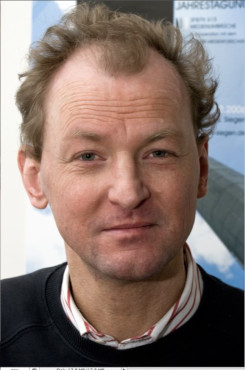
Erhard Schüttpelz, born in 1961 in Haldern (now Rees), studied in Hannover, Exeter, Bonn, Cologne and Oxford (St. Johns) and completed his doctorate in 1994 at the University of Bonn. In 1994/95 he was a Feodor Lynen Fellow of the Alexander von Humboldt Foundation at Columbia University, New York. From 1996 to 1998, he was a postdoc at the DFG Research Training Group Theory of Literature and Communication at the University of Konstanz; from 1998 to 2003, he was a research associate preparing and then working at the DFG Collaborative Research Centre Media and Cultural Communication at the universities of Cologne, Bonn and Aachen. He completed his habilitation at the University of Konstanz in 2003, where he was scientific coordinator of the research initiative Cultural Theory and Theory of the Political Imaginary from 2003 to 2005, funded by the Gottfried Wilhelm Leibniz Prize awarded to Albrecht Koschorke. In 2005, he was a fellow at the IFK (Vienna). Since 2005, he has been a professor of media theory at the University of Siegen. Principal investigator of the DFG Research Training Group Locating Media and the DFG Collaborative Research Center Media of Cooperation. 2012-2016 Elected member of the DFG Review Board 103, 2018-2022 Member of the University Council of the University of Siegen. He has also held fellowships in Weimar, Konstanz, Berlin (FU), Münster and at the Center for Advanced Studies – Erlangen.
His interests are in the fields of philology and cultural studies. They first led him from structuralist literary theory to the linguistic theory of rhetorical figures, fuelled by a fondness for impossible syntheses that could have bridged the gap between continental and analytical philosophy, for cross-disciplinary border crossers, for the history of science in the humanities in the context of science and technology studies, and for figures of transition, border objects, tricksters, disturbances, images. He found his home in the German media studies that had emerged in the meantime – of which he says they are »a discipline that I could neither have studied nor better have thought up in order to pursue my interest in opportunities for cooperation.«
His films and books include, among others, a film with the working title Gaabi Cirey! and the voice of Hanns Zischler (with Anja Dreschke and Carlo Peters), the film A Kind of World War (with Anselm Franke, 2021), online at: https://www.hkw.de/de/app/mediathek/video/84649 and the books A Kind of World War / Eine Art Weltkrieg (with Anselm Franke, Berlin, Haus der Kulturen der Welt, 2021), Die Moderne im Spiegel des Primitiven. Weltliteratur und Ethnologie 1870-1960 (Munich 2005), Deutland (Berlin 2023) and Medium, Medium: Elemente einer Anthropologie (Berlin 2025). His volume »Schlangenritual«. Der Transfer der Wissensformen vom Tsu’ti’kive der Hopi bis zu Aby Warburgs Kreuzlinger Vortrag (Berlin 2007), co-edited with Cora Bender and Thomas Hensel, emerged from a conference at the Warburg-Haus in 2002.
-
2024
Valentin Groebner
Wissenschaftspreis
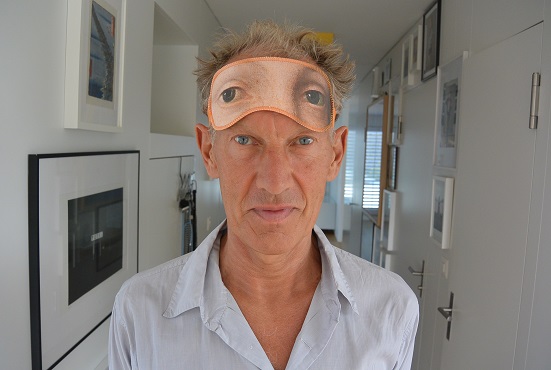
Foto: Saskia Ramminger
Valentin Groebner, born in Vienna in 1962, teaches Medieval and Renaissance History at the University of Lucerne since March 2004, after stays as a wandering scholar in Berlin, Cambridge/Massachusetts, Paris and Zurich. The texts and images from the past he is interested in are embarrasingly contaminated with the mundane everyday present. He has worked on corruption and political language in the 15th and 16th centuries (Liquid Assets, Dangerous Gifts, Philadelphia 2002), on images of extreme violence (Defaced, New York 2004) and on the history of passports and identification (Who Are You?, New York 2007). More recent books deal with modern stagings of history (Das Mittelalter hört nicht auf, Munich 2008), the artifical worlds of tourism (Retroland, Frankfurt/M. 2018), the paradoxes of self-fashioning (Bin ich das? Eine kurze Geschichte der Selbstauskunft (Frankfurt/M. 2021) and the commodity forms of the aesthetic (Aufheben, Wegwerfen. Vom Umgang mit schönen Dingen, Konstanz 2023). Currently, he is pondering about nostalgia. How do we interact with the lost worlds of yesterday we so melancholically (and lustfully) long for?
December 5th, 2024, 7 pm
Lecture: »Pathosformel und Affekt: Über aufregende Bilder und ihr Nachleben« -
2023
Valeska von Rosen
Wissenschaftspreis, Martin Warnke-Medaille
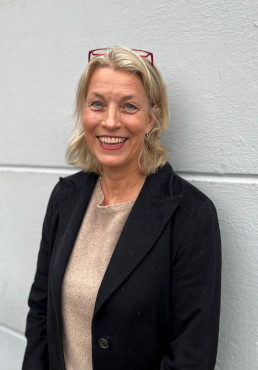
Valeska von Rosen (*1968 in Berlin) holds the chair of art history of the modern period up to early modernism at the Heinrich Heine University Düsseldorf. She previously taught at the Ruhr-Universität Bochum and the universities of Jena and Potsdam, among others. Research stays took her to the Wissenschaftskolleg zu Berlin (Institute for Advanced Study), the Bibliotheca Hertziana (Max Planck Institute for Art History, Rome) and the International Kolleg Morphomata of the University of Cologne. She has received funding from the German Research Foundation, the Gerda Henkel Foundation, and the VW Foundation (opus magnum).
Her major publications include: Mimesis und Selbstbezüglichkeit in Werken Tizians (2001), Caravaggio und die Grenzen des Darstellbaren (2009), Verhandlungen in Utrecht. Ter Brugghen und die religiöse Bildsprache in den Niederlanden (2015). As (co-)editor she published on »Der stumme Diskurs der Bilder« (2003), Erosionen der Rhetorik (2012), Poiesis. Praktiken der Kreativität (2013), Amor sacro e profano (2013), on Giovanni Pietro Bellori’s Vita of Caravaggio (2018), Multiple Epochisierungen (2021) and Gattungsmischungen – Hybridisierungen – Amalgamierungen (2022).
She is working on the contouring of a ›Bildwissenschaft‹ that is based on the reconstruction of historically adequate patterns of thought about the arts and their producers and is particularly interested in questions of artistic poiesis, models of thought of the non-normalized, and the specific discursivity of image and text. Currently, Valeska von Rosen is researching the genesis of the European artist’s self-portrait and historiographic models of order that were already developed in the early modern period against Vasari’s narrative of a linear development of art.
December 11th, 2023, 7 pm
Lecture: »Alberti – Dürer – Michelangelo. Künstlerselbstbildnisse vor dem Zeitalter des Subjekts« -
2022
Marie-José Mondzain
Wissenschaftspreis
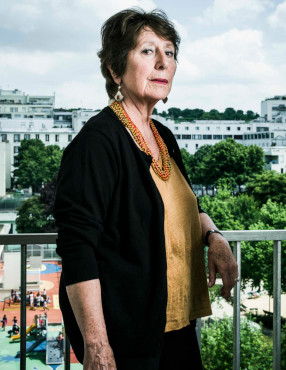
Marie-José Mondzain, born in Algiers in 1944, is an art historian and philosopher. She studied at the École normale supérieure (ENS) in Sèvres. She was directrice de recherche and director of the Groupe de Sociologie Politique et Morale (GSPM) at the Centre National de la Recherche Scientifique (CNRS), Paris. Her research interests are in Byzantine culture and image theory, to which she added a modern iconology, among others with the book Image, Icon, Economy. The Byzantine Origins of the Contemporary Imaginary (Stanford University Press, 2004). She deepened iconological analyses in Homo spectator (Bayard, 2007), among other works. Her iconological research is also devoted to the analysis of ethical components of images, especially the implications of the impact of violence through images.
Other selected publications include the books L’image peut-elle tuer? (Bayard, new edition 2015), L’Image naturelle (Le Nouveau commerce, Paris 1995), Van Gogh ou la peinture comme tauromachie (Epure, Paris 1996), Transparence, opacité? 14 artistes contemporains chinois (Les Éditions Cercle d’art, 1999), Le Commerce des regards (Seuil, Paris 2003). In addition, she is the author of numerous articles on fundamental issues in image studies, including »Iconic space and the rule of lands«, in Hypatia 15 (4), 2000; »Nouvelles technologies de l’image et démocratie«, in Horizons Philosophiques 11 (1), 2000. L’image peut-elle tuer? (Bayard, 2002) appeared in German translation under the title Können Bilder töten? in 2006, published by diaphanes in Zurich. She has devoted publications to further questions of image and art studies, especially on photography and film, including L’incarnation chez Andrei Tarkovsky (Esprit, Summer 2004); Matérialisme photographique, Autour d’Eric Rondepierre (Paris, Éditions Léo Scheer, 2003); Qu’est-ce que tu vois? (Gallimard, 2008) and Images (à suivre). De la poursuite au cinéma et ailleurs (Bayard, 2011).
October 27th, 7.00 pm
Lecture: »Image and Pharmakon. Aby Warburg’s Self Healing« -
Katharina Sykora
Wissenschaftspreis
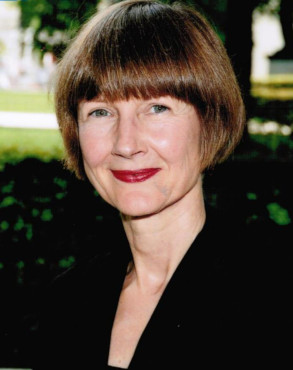
Katharina Sykora is an art historian who after working as researcher in archives and museums was professor at Ruhr University Bochum and Braunschweig University of Art (HBK) from 1994 until 2018. She held Guest Professorships and fellowships at the University of Bloomington, Indiana, the Rockefeller Center, Bellagio, and the Thomas Mann House, Pacific Palisades, among others.
In her research she focuses on visual constructions of gender and authorship, on representations of affects and death, on classification systems and their perception, and on intertextualities between photography, painting, and film.
A selection of her monographic work includes: Überfliegen. Figuren erratischer Wahrnehmung (Göttingen 2021); Die Tode der Fotografie, vol. 1: Totenfotografie und ihr sozialer Gebrauch (Paderborn and Munich 2009); vol. 2: Tod, Theorie und Fotokunst (Paderborn and Munich 2015); Figurenspiele. Texte zum Film (Marburg 2013); As You Desire Me. Das Bildnis im Film (Cologne 2003); Unheimliche Paarungen. Androidenfaszination und Geschlecht in der Fotografie (Cologne 1999).
As editor or co-editor she published among others: Migration as Agitation – The Photographic Beyond the Image (Vienna 2016); Valenzen fotografischen Zeigens (Weimar 2016); Fotografische Leidenschaften (Marburg 2006); Was ist ein Künstler? Das Subjekt der modernen Kunst (München 2003); Körperproduktionen. Zur Artifizialität der Geschlechter (Marburg 2002); Die ‚Neue Frau‘. Eine Herausforderung für die Bildmedien der Weimarer Republik (Marburg 1993).
December 9th, 2021, 7 pm
Lecture: »Fraktur. Weiblichkeit, der gebrochene Blick und das Nachleben der Shoah bei Boris Lurie« -
2020
Victor I. Stoichita
Wissenschaftspreis, Martin Warnke Medal
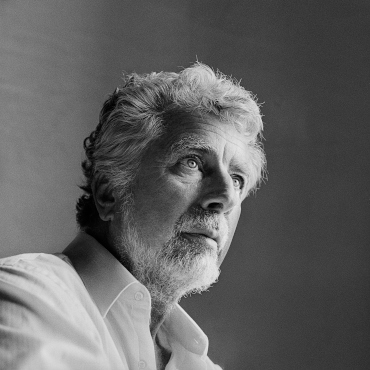
Foto: Giorgia Fiorio
Victor I. Stoichita (* 1949, Bucharest) is professor emeritus of the University of Fribourg (CH), where he was professor for Early Modern Art History from 1991 to 2019. He studied art history, philosophy and comparative literature at the University of Bucharest, the University La Sapienza, Rome (Tesi di Laurea di Dottore in Lettere), the University of Munich (Humboldt Fellow) and the Université Paris I Panthéon-Sorbonne (Doctorat d’état ès Lettres). His books, including The Self-Aware Image. An Insight into Early Modern Meta-Painting (1997), A Short History of the Shadow (1997) and Darker Shades. The Racial Other in Early Modern Art (2019), were considered groundbreaking contributions at the intersections of art history, visual anthropology and media studies, and have been translated into numerous languages.
Victor I. Stoichita has taught at numerous universities in Europe and the United States and was a Fellow at the Institute for Advanced Study in Princeton (1990), the Getty Research Center (1998), the Wissenschaftskolleg zu Berlin (2002-2003), as well as Rudolf Wittkower Visiting Professor at the Bibliotheca Hertziana – Max Planck Institute for Art History, Rome (2005-2006) and Visiting Professor at the Center for Advanced Study in the Visual Arts of the National Gallery, Washington (D.C., 2011), among others. He has also held the Louvre Chair in Paris (2014) and the International Francqui Chair at several Belgian universities (2014), the Panofsky Professorship at the Zentralinstitut für Kunstgeschichte (Munich) in 2016 and the Chaire européene at the Collège de France in 2017-2018. In 2017 he gave the Bernard Berenson Lectures at The Harvard University Center for Italian Renaissance Studies (Villa I Tatti, Florence). Recently, he has been a a fellow at the Center for Advanced Studies BildEvidenz. History and Aesthetics at Freie Universität Berlin from October 2019 to January 2020.
His autobiographical novel Oublier Bucarest (Actes Sud, 2014) was awarded the Médaille de Vermeil of the Prix du Rayonnement de la langue et de la littérature françaises of the Académie Française. In 2014 he was appointed Chevalier of the ordre des Arts et des Lettres (Order of Arts and Letters) of the French Republic. Victor I. Stoichita is a member of the Academia Europaea, an associate member of the Royal Academy of Belgium and a foreign member of the Polish Academy of Sciences and Arts and of the Italian National Academy Accademia dei Lincei.
December 12th, 2022, 7 pm
Lecture: »Text – Bild – Textur. Zu den Spinnerinnen von Diego Velázquez« (Text-Image-Texture. On Diego Velàzquez’ Las Hilanderas)Due to circumstandes during the corona virus epidemic in 2020/2021, the award ceremony and lecture took place in 2022.
-
2019
Emmanuel Alloa
Wissenschaftspreis
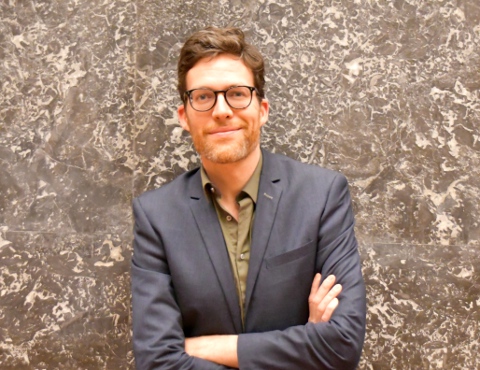
Professor Emmanuel Alloa holds the chair for Aesthetics and the Philosophy of Art at the Department of Philosophy of the University of Fribourg (CH) since 2019. He previously taught and researched at the University Paris 8, the Swiss NCCR National Centre of Competence in Research »Iconic Criticism« (eikones), Basel, and the University of St. Gallen. He was a guest professor and fellow at The Italian Academy at Columbia University, at the Universidad San Nicolás de Hidalgo (Mexico), at UFMG Belo Horizonte (Brazil), at the Internationales Kolleg für Kulturtechnikforschung und Medienphilosophie (IKKM) of the Bauhaus-Universität Weimar and at UC Berkeley, amongst others.
His publications include La résistance du sensible: Merleau-Ponty, critique de la transparence (Paris 2008), English: Resistance of the Sensible World. An Introduction to Merleau-Ponty (New York 2017); Das durchscheinende Bild. Konturen einer medialen Phänomenologie (Berlin/Zurich, 2nd ed. 2018), and Partages de la perspective (Paris 2020). As an editor, co-editor and translator he has published a dozen volumes, including the anthology Bildtheorien aus Frankreich (Munich 2011) and the three volumes of the series Penser l’image (Dijon 2010-2017).
January 24th, 2020, 7 p.m.
Lecture: »Umgekehrte Intentionalität. Über emersive Bilder« (Reverse intentionality. On emersive imagery) -
2018
Andrea Pinotti
Wissenschaftspreis
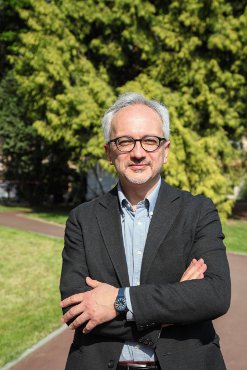
Professor Andrea Pinotti holds the Chair for Aesthetics at the Department of Philosophy of the University of Milan. He was a Fellow at different international institutions such as The Italian Academy at Columbia University, the Warburg Institute in London, the Zentrum für Literatur- und Kulturforschung in Berlin, and the Institut d’études avancées and Fondation Maison des Sciences de l’Homme in Paris.
His main research areas are visual culture studies and sciences of art. His monographs include, among others: Il corpo dello stile. Storia dell’arte come storia dell’estetica a partire da Semper, Riegl, Wölfflin (1998); Estetica della pittura (1997, spanish translation: Estética de la pintura, 2011); Memorie del neutro. Morfologia dell’immagine in Aby Warburg (2001); Empatia. Storia di un’idea da Platone al postumano (2011, french translation: Empathie. Histoire d’une idée de Platon au post-humain, 2016).
Together with Antonio Somaini, he edited the anthology Teorie dell’immagine. Il dibattito contemporaneo in 2009 and in 2016 the book Cultura visuale. Immagini sguardi media dispositivi.Currently, he works on a phenomenology of virtual immersive environments.
December 4th, 2018, 7 p.m.
Lecture: “Replik der Gewalt, Replik auf die Gewalt” (Replica of violence, Replica to violence) -
2017
Elisabeth Bronfen
Wissenschaftspreis, Martin Warnke Medal
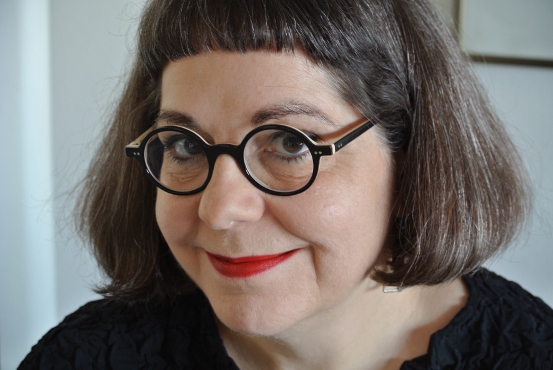
Foto: Susan Bronfen
Elisabeth Bronfen is Professor of English and American Studies at the University of Zurich and, since 2007, Global Distinguished Professor at New York University. Her habilitation on the representations of femininity and death was published in 1992 as Over Her Dead Body. Death, Femininity and the Aesthetic. The book appeared in German, too, in 1994 and 1997. Numerous of her books and essays, among themThe Knotted Subject. Hysteria and its Discontents (1998), Liebestod und Femme fatale. Der Austausch sozialer Energien zwischen Oper, Literatur und Film (2004), Crossmappings. Essays zur visuellen Kultur (2009) have been highly influential beyond her own subject field. Works such as Home in Hollywood. The Imaginary Geography of Cinema (2004) and Hollywoods Kriege. Geschichte einer Heimsuchung (2013), or on seriality and series formats such as Mad Men (2015) develop her practice of cultural crossmapping and investigate dimensions of the American Cultural Imaginary. Her current research projects include the gender of political sovereignty and Shakespeare’s afterlife.
December 12, 2017, 7 p.m.
Lecture: “Hermiones Rückkehr – Das Nachleben einer Pathosformel” (Hermione’s comeback – The afterlife of a pathos formula) -
2016
Jacqueline E. Jung
Wissenschaftspreis
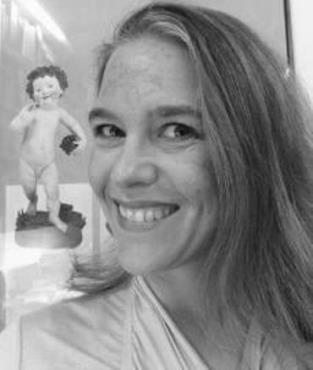
Jacqueline Jung is Associate Professor in the Department of History of Art at Yale University, where she works in the field of medieval European art and architecture, with a special focus on figural sculpture in Germany and France. Her first book, The Gothic Screen: Space, Sculpture, and Community in the Cathedrals of France and Germany, ca. 1200–1400 (Cambridge University Press, 2013), received the PROSE Award for Art History and Criticism from the Association of American Publishers and the John Nicholas Brown Prize from the Medieval Academy of America. A new book, Eloquent Bodies: Movement, Expression, and the Human Figure in Gothic Sculpture is forthcoming from Yale University Press. Her essays have appeared in numerous periodicals and anthologies in the United States and Germany, and she has published translations of seminal works of German scholarship such as Aloïs Riegl’s Historische Grammatik der bildenden Künste (Zone Books 2004).cht.
April 5th, 2017, 7 p.m.
Lecture: “The ‚Gerichtspfeiler‘ as ‚Gedankenpfeiler‘: Movement, Medium, and Memory in the Strassburg South Transept” -
2015
Lambert Wiesing
Wissenschaftspreis
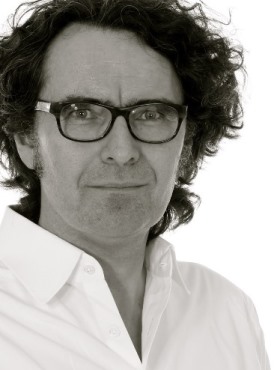
Prof. Lambert Wiesing currently holds the chair of visual theory and phenomenology and is the director of the Institute of Philosophy at the Friedrich-Schiller-Universität Jena; he has served as a guest professor at the universities of Vienna and Oxford and was president of the Deutsche Gesellschaft für Ästhetik in 2008. His main specialisms are the philosophy of perception and images, and he has published various monographs on these topics, some of which have been translated into multiple languages, incl.: Stil statt Wahrheit (1991), Die Sichtbarkeit des Bildes (1997), Phänomene im Bild (2000), Artifizielle Präsenz (2005), Das Mich der Wahrnehmung (2009), and Sehen lassen (2013). Lambert Wiesing was awarded the Wissenschaftspreis of the Aby Warburg Foundation in 2015.
Keynote lecture: ‘Formale Ästhetik: Vom Kunstwerk zum Designobjekt’ (Formal Aesthetics: From Artwork to Design Object)
-
2014
Eva Schürmann
Wissenschaftspreis
Prof. Dr. Eva Schürmann ist seit 2011 Inhaberin des Lehrstuhls für Philosophische Anthropoligie, Kultur- und Technikphilosophie an der Otto-von-Guericke-Universität Magdeburg. Zu ihren Arbeitsschwerpunkten gehört die Philosophische Ästhetik, verstanden als theoretische Reflexionsdisziplin des Wahrnehmens und Sichtbarmachens. Mit ihrer Habilitationsschrift zur kulturellen Praxis des Sehens, die 2008 im Suhrkamp Verlag erschienen ist, lieferte sie eine grundlegende Theorie des Gesichtssinnes. Eva Schürmann hat den Wissenschaftspreis der Aby-Warburg-Stiftung 2014 erhalten.
Festvortrag: „Homo Depictor. Vom Darstellen als Lebensform”
-
2014
Michael Hagner
Wissenschaftspreis, Martin Warnke-Medaille
Prof. Dr. Michael Hagner, Professor für Wissenschaftsforschung an der ETH Zürich, hat mit seinen Arbeiten zur Kulturgeschichte der Neurowissenschaften, in denen er Probleme und Frgestellungen aus dem Blickwinkel verschiedener Wissenskulturen bewertet, weit über seine eigene Disziplin hinaus gewirkt. Zu seinen wichtigsten Büchern gehören „Homo Cerebralis. Der Wandel vom Seelenorgan zum Gehirn“ und Der Hauslehrer. Erziehung, Sexualität und Medien um 1900.“
Festvortrag: „Zwölfmal ich. Charles Nègre und die fotografischen Wirkungen, die uns zum Träumen bringen.“
-
2013
Barbara Wittmann
Wissenschaftspreis
Prof. Dr. Barbara Wittmann ist Juniordirektorin am internationalen Kolleg für Kulturtechnikforschung und Medienphilosophie (IKKM) in Weimar. Sie wurde 1999 mit einer Arbeit über das Portraitwerk Éduard Manets an der Freien Universität Berlin promoviert. Im Frühsommer 2013 hat sie ihre Habilitation zur Kultur- und Wissensgeschichte der Kinderzeichnung an der Bauhaus-Universität Weimar eingereicht. Ihre Schwerpunkte in Forschung und Lehre liegen in der Kunstgeschichte des 19. und 20. Jahrhunderts, der Geschichte und Theorie des Zeichnens sowie der wissenschaftlichen Visualisierung. Barbara Wittmann hat der Wissenschaftspreis der Aby-Warburg-Stiftung 2013 erhalten.
Festvortrag: „Aby Warburg und die Kinderzeichnung als Fossil der Kulturgeschichte”
-
2012
Mischa Meier
Wissenschaftspreis
Prof. Dr. Mischa Meier ist Professor für Alte Geschichte an der Universität Tübingen. Er wurde 1998 in Bochum mit einer Arbeit zum frühen Sparte promoviert und habilitierte sich 2002 in Bielefeld mit der Untersuchung „Das andere Zeitalter Justinians. Kontingenzerfahrung und Kontingenzbewältigung imn 6. Jahrhundert n. Chr.“. Seine aktuellen Arbeitsschwerpunkte liegen vor allem im Bereich der Spätantike, der frühen Römischen Kaiserzeit und der Griechischen Geschichte. Daneben beschäftigt er sich auch mit Fragen der Rezeptions- und Wirkungsgeschichte der Antike im 19.-21. Jahrundert. Mischa Meier erhält den Wissenschaftspreis der Aby-Warburg-Stiftung 2012.
Festvortrag: „Caesar und das Problem der Monarchie in Rom“
-
2011
Karl-Siegbert Rehberg
Wissenschaftspreis
Karl-Siegbert Rehberg (geb. 1943) war Mitarbeiter und promovierte bei Arnold Gehlen 1973 in Aachen, ist Herausgeber der Gehlen Gesamtausgabe und seit 1992 Inhaber des Lehrstuhls für Soziologische Theorie, Theoriegeschichte und Kultursoziologie an der TU Dresden. Neben zahlreichen Veröffentlichungen zur soziologischen Theorie stechen seine Arbeiten zur Verbindung von Gesellschaft, Kultur und Kunst hervor; bezeichnend der Titel der ihm gewidmeten Festschrift „Kunst, Macht und Institutionen“ (2003); er ist u.a. Herausgeber und Autor von „Abstraktion im Staatssozialismus“ (2003) und „Kunst in Leipzig“ (2009).
Festvortrag: „Kunst-Staat DDR. Kunst im Staatssozialismus und die deutsche Doppelflucht aus der Geschichte“
-
2011
Wolfgang Ullrich
Wissenschaftspreis, Martin-Warnke-Medaille
Prof. Dr. Wolfgang Ullrich, Professor an der Hochschule für Gestaltung in Karlsruhe, etablierte sich durch eine lange Reihe von Publikationen – genannt seien „Mit dem Rücken zur Kunst“, „Tiefer hängen. Über den Umgang mit Kunst“, und „Was war Kunst?“ – als einer der führenden Kunstwissenschaftler auf dem Gebiet der öffentlichen Wirkungsgeschichte von Kunst.
Festvortrag: „Wie. Zur Rolle des Vergleichens im Umgang mit Kunst“
-
2010
Gerd Blum
Wissenschaftspreis
Prof. Dr. Gerd Blum, Professor für Kunstgeschichte/Kunstwissenschaften an der Kunstakademie Münster. Im akademischen Jahr 2010/2011 Fellow am Exzellenzcluster „Kulturelle Grundlagen von Integration“ der Universität Konstanz. Studium der Kunstgeschichte, Philosophie und Klassischen Archäologie an den Universitäten München, Bochum und Berlin sowie an der Scuola Normale Superiore di Pisa. Promotion mit einer Arbeit über Hans von Marées (1999) an der Universität Basel. 1997 Wissenschaftlicher Mitarbeiter an der Universität Wuppertal, 1998-2001 an der Universität Konstanz. Im akademischen Jahr 2007/08 Gastprofessor in Vollzeit am Institut für Europäische Kunstgeschichte der Universität Heidelberg. Habilitationsschrift über „Ideale Orte und inszenierte Ausblicke. Architektur und Landschaft in der italienischen Renaissance“.
Festvortrag: „Von Bezaleel bis Michelangelo. Vasari über jüdische und christliche Kunst“
-
2007
Anke te Heesen
Wissenschaftspreis
Festvortrag: „Lomorisierte Objekte. Präsentationsweisen alltäglicher und wissenschaftlicher Artefakte”
-
2008
Christoph Asendorf
Wissenschaftspreis, Martin-Warnke-Medaille
Festvortrag: „Körper in Kraftfeldern. Kunst, Krieg und Raumtheorie in der Klassischen Moderne”
-
2008
Roberto Calasso
Wissenschaftspreis
Festvortrag: „Baudelaire und der Bilderkult”
-
2007
Carla Hesse
Wissenschaftspreis
Festvortrag: „Reading in Extremis: French Revolutionaries Respond to Rousseau”
-
2006
Cornelia Zumbusch
Wissenschaftspreis
Festvortrag: „‚Motion is Emotion’: Melodramatische Bewegung bei Warburg, Goethe und Rousseau”
-
2006
Jeroen Stumpel
Wissenschaftspreis
Festvortrag: „The Persistence of Images. Reproductive Success and its Riddles in the History of Art”
-
2005
Wolfgang Schivelbusch
Wissenschaftspreis, Martin-Warnke-Medaille
Festvortrag: „Die Verdauung der Natur”